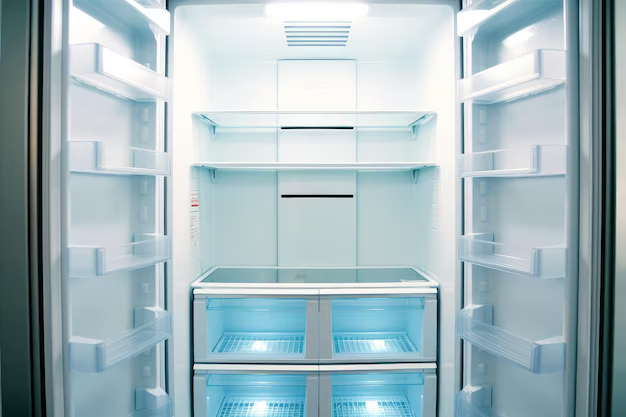Why Is My Refrigerator Freezing Everything? A Comprehensive Guide
Have you ever opened your refrigerator only to find that your leafy greens look more like they've been through a frostbite experiment than a cool, refreshing storage? If your fridge is turning its contents into an unplanned icebox, you're not alone. Many households encounter this chilly conundrum, and the causes can range from simple user errors to more complex mechanical issues. Not to worry, though—understanding why your refrigerator is freezing can save you from both culinary disappointments and costly repairs.
🌡️ Understanding How Refrigerators Work
Before diving into why your fridge might be overachieving in the cold department, it’s helpful to understand the basic operational mechanics. A refrigerator works by circulating refrigerant fluid through a series of coils. This fluid absorbs heat from inside the fridge, leading to a cooler interior space.
How the Thermostat Controls Temperature
The thermostat is essentially the brain of your refrigerator. It measures the internal temperature and regulates the compressor. When temperatures rise above the set level, the thermostat signals the compressor to turn on and begin circulating the refrigerant. If the thermostat malfunctions, it may cause the compressor to run excessively, which can lead to freezing.
🧊 Common Causes of Refrigerator Freezing
Temperature Settings Set Too Low
One of the most straightforward reasons for a refrigerator freezing up is a temperature setting that is simply too low. Keeping your fridge below the optimal range (typically between 35-38 degrees Fahrenheit) can cause liquids to solidify and produce a frosty environment.
Quick Tip: Ensure that you regularly check and adjust the thermostat settings as needed, especially during seasonal changes.
Improper Airflow Inside the Refrigerator
Organizing your refrigerator can prevent inadequate airflow, which might lead to uneven cooling and freezing. Blocked air vents, often located at the back of the fridge, can cause cold air to accumulate at the bottom and freeze items.
Organizational Pointers:
- Avoid overfilling your refrigerator.
- Ensure vents are not blocked by food items.
Faulty Door Seals
A damaged or failing door seal can introduce warm air into the fridge, which might then trigger the excessive cooling cycle as the system struggles to compensate.
Maintenance Check: Regularly inspect door seals for cracks or tears. Cleaning the seals can also prevent dust and residue buildup that might compromise their efficiency.
Malfunctioning Thermistor
The thermistor is an electronic component within your refrigerator that helps regulate temperature by sending readings to the thermostat. If the thermistor malfunctions, inaccurate temperature readings could lead the compressor to overwork and cause freezing.
Refrigerant Shortfall
A low refrigerant level decreases the efficiency of the cooling system, resulting in uneven temperature regulation. Overfilling or underfilling with refrigerant usually demands professional handling.
🔧 Troubleshooting and Solutions
Not all refrigerator freezing issues require a professional call-out. Here are some steps you can take before summoning technical help:
Self-Assessment Checklist
- Check Thermostat Settings: Ensure they're set within the recommended range.
- Examine Airflow: Rearrange items to prevent blocking the vents.
- Inspect Door Seals: Look for visible damage and ensure they are sealing tightly.
- Empty the Defrost Drain: If accessible, remove obstructions that might lead to excess moisture and freezing.
When to Call a Professional
If troubleshooting doesn’t yield results, it might be time to involve an expert, especially if:
- The thermistor is presumed faulty.
- You suspect refrigerant issues.
- You are uncertain about complex thermostat malfunctions.
🗂️ Handy Tips to Prevent Future Freezing
Here’s a handy summary to keep your fridge running smoothly and avoiding the frost monster:
- Regular Temperature Checks: Adjust settings as per seasonal changes.
- Monitor Airflow: Space out items to facilitate proper cooling.
- Inspect Seals and Gaskets: Ensure they are clean and undamaged.
- Defrost Regularly: If your fridge doesn’t auto-defrost, regular manual defrosting can prevent excess frost buildup.
🤔 Are Some Items More Prone to Freezing?
Certain foods are particularly vulnerable to cold temperatures. Leafy greens, eggs, and dairy products like milk can start freezing when temperatures dip even slightly. Storing these items on higher shelves, where temperatures tend to be a touch warmer, can often prevent unintentional freezing.
⚙️ Understanding the Role of Technology
Modern refrigerators come equipped with various features like frost-free technology, multi-airflow systems, and smart sensors designed to minimize freezing risks. If you’re considering an upgrade or repair, understanding these terms can help make informed decisions.
🌟 Optimizing Your Refrigerator Use
Keeping a well-functioning refrigerator is part and parcel of maintaining a smoothly running kitchen. By embracing good practices—regular maintenance checks and proper organization—you can avoid the frustration of discovering frozen-solid groceries. Remember, a little preventive care goes a long way!
In conclusion, a refrigerator that freezes everything isn’t just an inconvenience; it’s an opportunity to better understand the intricacies of a device we often take for granted. By being proactive and informed, you can easily navigate this common household issue and ensure your refrigerator is cooling—rather than overcooling—everything just right.

